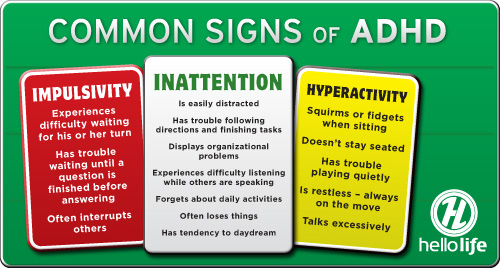Ava* and Matthew* knew their son Sam’s* disruptive and violent behavior wasn’t like the other children his age, but they didn’t understand what was causing it or how to discipline him each time it occurred. These parents, like many others, felt helpless because they didn’t know the signs of Attention Deficit Hyperactivity Disorder (ADHD).
* All names have been changed to protect this family’s privacy.
Early Signs
Sam’s behavioral struggles were as much a part of his preschool years as time spent building with colorful blocks. Looking back, Ava recalls how visibly upset Sam became with any changes in routine or structure. He mostly played by himself as problems would arise when playing with his peers. He disrupted class with his violent out bursts and became uncontrollable.
“We want to help him,” the preschool director told Ava and Matthew at a conference. Her actions didn’t match her words when an hour later she called Ava at work, demanding Sam be picked up.
The early signs of ADHD were present but not affirmed when the private counselor they sought out attributed Sam’s behaviors to “Boys will be boys” and “He’ll grow out of it.”
Behavior Management System
Ava vividly remembers how she and Matthew felt during those years: “We were embarrassed. I felt like we were bad parents – as though we were doing something wrong. We couldn’t find any answers.”
Kindergarten was an equally challenging year. Ava proactively told Sam’s teacher about his behavioral struggles and asked her to offer more challenging assignments, which seemed to reduce his inappropriate behaviors.
Even though he was assigned a talented teacher, her class that year had several students with similar behavioral issues. This only made things worse for Sam – he continued to be disruptive, uncooperative, and frequently did not follow the teacher’s directions. The class behavior management system of moving colors didn’t offer Sam opportunities to redeem himself, causing him to become even more disruptive.
 The school counselor promised to offer Sam and the other poorly behaved students in his class a bimonthly anger management group, but according to Ava it only happened once.
The school counselor promised to offer Sam and the other poorly behaved students in his class a bimonthly anger management group, but according to Ava it only happened once.
A bright light came near the end of the year when Sam was given a part in the Kindergarten performance. He could not have been more excited. However, Sam became irrational and uncooperative one day at practice. The music teacher gave his part to another student without notifying Ava or Sam.
Unable to control his emotions when his replacement took his place on stage, Sam pushed the student against the wall. This resulted in a one day out of school suspension. The once bright light was abruptly extinguished.
Ava and Matthew once again sought the help of the private counselor. “The public schools are tough,” was all she said.
Finding Answers
In the fall of Sam’s 1st grade year, he began playing rec league football. It offered him a physical challenge and helped reduce his aggression. In addition to football, Ava signed him up for piano lessons to help increase his focus.
Sam’s fall achievement test scores revealed very high scores, which started the ball rolling for Sam to be considered for the accelerated classes at his school.
With this positive information in hand, Ava and Matthew had Sam evaluated by a private psychologist to validate Sam’s intelligence and determine the cause of his ongoing behavioral issues. The test results confirmed Sam’s high intelligence and suggested diagnoses of ADHD combined type and Oppositional Defiant Disorder (ODD).

Ava and Matthew cried. As happy as they were that their son was highly intelligent, they were equally as upset about the two behavioral diagnoses. “It was a low point for us. Once again, we felt like failures as parents,” she remembers. The idea of treating these issues with medicines was daunting. They were apprehensive and hesitant about the side effects of the medicine: possible suppression of appetite, not sleeping well, and losing his quirkiness.
Sometimes finally finding answers is as hard as not knowing. After some consideration, Ava and Matthew decided to have Sam try the medicine. It was a bumpy road at first. Even though Sam still had some behavioral struggles at school and at home, they noticed Sam wasn’t nearly as loud, was more responsible, and started exhibiting more confidence.
After Christmas of his 1st grade year, Sam was accepted into the accelerated program at school. The academic challenge encouraged him to be more engaged in academic activities and less disruptive.
That summer, upon the recommendation of Sam’s psychologist, Sam began participating in an art therapy group. It provided opportunities for Sam to practice the social skills he’d been taught with peers while enjoying creative activities.
Embrace the Child You’re Given
 Sam will be in the 5th grade in the fall of this year. The combination of medication, therapies, activities, and the accelerated classes continue to help him be successful.
Sam will be in the 5th grade in the fall of this year. The combination of medication, therapies, activities, and the accelerated classes continue to help him be successful.
His ADHD and ODD won’t go away; instead, Sam has learned strategies to help him face his struggles and deal with them appropriately. He still has bad days, but they occur much less often now.
I asked Ava about how Sam’s diagnoses impact his life. “He knows he has anger management issues, but the medicine helps him control himself. He is still hesitant to try things he is unsure of. Because he’s big for his age, his peers still make fun of him sometimes, but he has made a lot of progress with not getting angry when they do it. He has begun to make friends,” she said.
Ava and Matthew have seen much progress with Sam’s behavior in the last four years. Football provides the perfect connecting point for father and son. “Matthew helps coach Sam’s football team, giving him numerous opportunities to see the hurdles Sam has overcome since his diagnosis. He’s learned to embrace the child he’s been given,” Ava shares.
Ava has learned so much about parenting a child with behavioral struggles. I asked her to share her advice.
- Be persistent in seeking out help/solutions.
- Have an open mind to whatever the issue may be.
- Be willing to try the medications and therapies the doctors recommend.
- Be firm and provide structure.
- Constantly remind your child of the steps to take in each situation. Praise him when he behaves appropriately.
- Find your child’s strengths and point them out/praise them often.
- Allow family members/friends to give you a break so you can recharge.
Share with me: If you have a child or teach children with academic and/or behavioral struggles, please share your wisdom/advice with parents who are facing these struggles with their child.
If you are one of those parents who is just now learning about or coming to terms with your child’s struggles, please know you are not alone. Please visit my Resources page for information under the Academic/Behavioral Struggles heading and under the Support Groups heading.


As an educator, I see parents with children like this who simply place blame or avoid the problem not wanting a diagnosis. I applaud these parents for being vigilant and putting their child’s needs above their own fears of the dreaded diagnosis. They need to beat themselves up with a feather, not the hammer of bad parent guilt. They are far from bad parents!
Such a wonderful story. As an educator for over twenty years I have been able to witness first hand the “signs” of ADD/ADHD in children. It is very hard for some parents to acknowledge there may be a problem with their child. I like to ask these parents if they thought their child was a diabetic would they seek medical advice? A child having a learning problem or behavior problem is no one’s fault. Seeking medical advice is the first step to helping all involved.
Nothing frustrates me more than when people negate ADD/HD as a ‘parenting problem’. I have three kids and my oldest is textbook ADHD. School was fun for him-as he is a smart, funny kid that other kids like. He struggled however with following through on assignments, standing in line, controlling impulsivity-from getting up in the middle of class and wandering around the classroom to hugging his friends when he was happy and excited. Some of his friends at younger ages did not know how to handle that demonstrative affection. We had one counselor tell us to take him to the local police station and file an ‘unruly child’ report. He explained that the police would then take him into custody and hold him in a cell for four hours. HE WAS FIVE. Who would do that to a five year old?? He told his dad one day leaving kindergarten that he TRIED to listen to what his teacher was saying but that it was hard to look at her because “she vibrates.” We sought different professional opinions and finally found a wonderful therapist and psychiatrist and when he was six we started medication. School was still a struggle from year to year and very much teacher dependent. I had to be noisy sometimes and be his advocate when he could not. He had a teacher that would punish him by taking recess away. Hello?? The “H” stands for hyperACTIVE-he needed that activity. We came up with an alternative for when he acted out that was not punitive, did not draw attention to him that other kids noticed and worked much better. I did have to have the principal get involved in that fight that year. And I would do it again. School was not fun for him but he did it. Puberty changes made for some hurdles too. He had frequent ‘temper tantrums’ if you will will until the age of 12. Frustration manifesting itself. Teen years and the impulsive behaviors were not something I want to do over for sure…but by God’s grace we all made it.
He is now 19, a high school graduate and working full time as a certified welder. He loves being outside and working with his hands. As most ADHD kids, his ability to hyper-focus is amazing and serves him well. We have talked through the years and I have gained great insight the older he has become and the more able he has become to put his feelings into words. He is off his medication. He is considering college but not a big fan of organized education right now. He says he needs a “break from school and filling in circles on tests.” I can respect that. HE is a fun, loving kid, always has a smile on his face, game for just about anything, he loves loud and proud! I always know where he is when he is around and he always makes me smile. I would not change ONE THING about him. I adore him. And I respect him too. He is making his way in this world HIS way.
I would tell Ava and Matthew to just tie a knot in the rope and hang on. Its not an easy ride with an ADD kid but its not boring for sure!!! It hurts to see your kid struggle and we used those moments to teach Adam empathy and compassion. Teachable moments will abound!!!
Such brave parents! I know their story will help many!
It takes very dedicated parents to help these children and loving teachers.